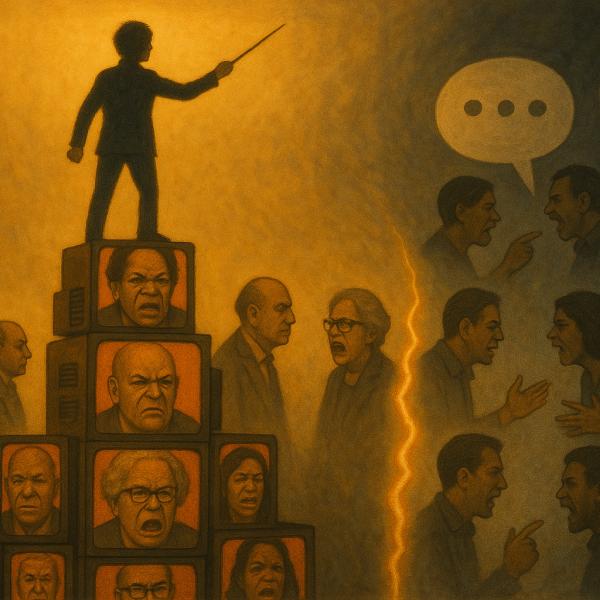
KQ Essential Takeaways
Sensationalism is presenting information in a shocking, exaggerated, selective, or emotionally provocative way to maximize audience engagement, often at the expense of accuracy, fairness, or depth.
In a post-internet, smartphone, and AI algorithms world, sensationalism has become powerful and ever-present. Platforms compete fiercely for our limited attention, and the rewards for engagement have dramatically increased. Most people know this part by now. In this piece, we’ll dig deeper.
These distortions affect not just our understanding of politics and news, but each area of our lives and even our views on reality itself. Recognizing the presence and danger of these forces is the crucial first step.
How We Got Here
Sensationalism is dramatically up in the digital age, but this is acceleration, not newness, as it has deep historical roots. From the "Yellow Journalism" of the 1890s (when newspaper tycoons like Hearst and Pulitzer used inflammatory headlines to increase circulation) to today's clickbait culture, the core drivers remain consistent:
- Natural competition for attention, power, and platform.
- Evolving media formats increase intensity, global reach, and potential earnings.
- Hard-wired human psychology responds to novelty and emotional triggers.
Notice that this isn’t all bad.
Sensationalism In The News
Sensationalism in the news dates back centuries. By the 15 and 1600s, publishers produced lurid pamphlets for mass audiences. The 1800s saw widespread sensational newspaper reporting.
A key example is the Spanish-American War, where history has since thoroughly disproven many sensational media claims. These included fabricated stories about Spanish atrocities against women and children, and the USS Maine battleship explosion which was immediately blamed on Spain but later determined to have been caused by an internal accident. These sensationalized reports played a significant role in pushing America toward war.
A more recent example is how media coverage and political rhetoric drove the Iraq War in 2003. Major news outlets amplified government claims about "weapons of mass destruction" in Iraq with dramatic headlines, fear-inducing graphics, and minimal skepticism. Political leaders used emotionally charged language about "mushroom clouds" and imminent threats, while networks featured experts who reinforced these narratives rather than presenting balance. This sensationalism helped justify the invasion—upon claims that were later debunked.
Today, there's remarkable agreement between Republicans and Democrats about mistakes leading to Middle East conflict that went too far.
What Sensationalism Does
The Spanish-American War example illustrates sensationalism's most extreme harm—its ability to provoke violence and conflict through emotional manipulation. But it damages society in many other tangible ways.
It erodes public trust, whether for institutions or individuals, when claims repeatedly prove false or biased.
It shapes risk perception, as people disproportionately fear dangers like plane crashes or shark attacks when the reality is about 3,000 people die of heart disease or car accidents for every 1 who dies of the former (or loses a leg). 🦈
It warps reality around violence, crime, and race. Most murders occur between people who know each other, yet media disproportionately covers stranger violence (and at levels of warping that our human brains can’t fully grasp)—and even more so when they cross racial lines.
This is not to say there haven’t been events needing special attention. It points out the extreme perception distortion and the systems that reward constant practices of warping.
And sensationalism of crime isn't new—from 19th century "penny dreadfuls" to today's true crime podcasts, theatrical crime storytelling has always attracted audiences, shaping public fears that hardly link to statistical reality.
It dominates societal attention, as we spend countless hours on manufactured controversies instead of important issues in our homes, communities, and nations.
Finally, it degrades basic critical thinking, training people to be spoon-fed emotional responses instead of thoughtfully considering. This creates vulnerability to manipulation in all spheres from consumer purchases to voting decisions—with real consequences for both personal and collective well-being.
AI vs Humans
Netflix’s popular "The Social Dilemma" documentary exposed social media's attention-capturing mechanisms and the immense financial powers at play.
Perhaps its most powerful insight was that there are two essential, theoretical moments when AI overpowers humans. The second—which everyone thinks about—is overcoming human strength (think Terminator, The Matrix, 2001: A Space Odyssey, Age of Ultron, or Black Mirror).
The first—which has already occurred—is AI overpowering human weakness.
This is abundantly clear in our widespread addictions to shopping, pornography, doom-scrolling, and unhinged political content that past generations would find baffling.
Sensationalism About Sensationalism (No One Is Immune)
But even a top piece highlighting the dangers of sensationalism often relies on dramatic reenactments, crafted interview clips, ominous music, and apocalyptic framing to gain its own audience.
This paradox extends beyond the documentary—it affects every anti-sensationalism initiative, including this very piece we write.
We face the same pressures we critique: to be heard in a noisy world, even discussions about the dangers of sensationalism are not immune to these forces. In fact, all who seek to reform need engaging content and compelling narratives to reach an audience. Even companies selling digital well-being tools (e.g. Light Phone) must market their products and compete to exist.
These factors don’t invalidate the core message. Rather, they remind us that resisting sensationalism isn't about eliminating emotion or engagement, it's about the hard work of creating good messages to be heard without taking shortcuts.
It’s not about being rigid and boring, but keeping integrity and consideration while navigating the attention economy.
Christians Aren’t Immune Either, Whether Now or Two Thousand Years Ago
From today's megachurch platforms to Montanism in 172 AD, Christians have faced similar trends of ongoing struggle against sensationalism and the supercharging of these existing forces in modern times.
History shows cycles of revival movements alternating between genuine renewal and manipulative excesses, and popular end-times interpretations drowning out sound doctrine.
The pattern persists because spiritual "milk" draws crowds more easily than the "solid food" of mature discipleship (Hebrews 5v12-14). Entry-level messages aren't bad, but building huge platforms of power and influence upon them goes far beyond what someone might say is just “a gifting for reaching the lost”…as far as insidious, self-serving harm against multitudes.
With sobering gravity, Jesus warns that for anyone who causes "one of these little ones to stumble, it would be better for them to have a large millstone hung around their neck and to be drowned in the depths of the sea" (Matthew 18v6)
This pattern over two millennia reminds us that sensationalism isn't just a secular media problem—it's a human tendency that can infiltrate even our most sacred spaces.
[ For our piece on sensationalism in Christianity, see here ]
How Far Makes It “Sensationalism”?
The short answer is no factual standard can exist on something fundamentally subjective. Like many difficult grey areas, it comes down to rare traits in the modern world: true character and wisdom.
Biblical Warning Against Craving Spectacle
The Bible specifically warns against craving spectacle. Jesus performed astonishing works but often withdrew from crowds afterward. He frequently told people to keep quiet about his miracles and about who he was. And he used parables to give deep truth to softened hearts while hiding it from the hardened.
When people demanded spectacle over salvation, Jesus rebuked them: "This is a wicked generation. It asks for a sign, but none will be given except the sign of Jonah" (Luke 11v29). Scripture repeatedly associates sensationalism with unbelief. People addicted to miraculous displays rarely develop mature faith. And it further foretells that even false prophets will use "great signs and wonders to deceive" (Matthew 24:24).
Being People of Wisdom in a Shallow World
The message of the Bible is not anti-emotion, but it consistently calls us to quiet wisdom and depth over hit sensation.
This pursuit is not easy. It requires patience, discernment, and humility—the opposite of the oceans of immediate gratification and constant stimulation we’re swimming in.
Paul urged believers to mature beyond spiritual milk to solid food (Hebrews 5v12-14), emphasizing that real development demands sustained effort and thoughtful engagement. This difficult path of depth over drama, reflection over reaction, and substance over sensation forms followers of Jesus and enables us to offer enduring value to a world drowning in noise.
Important Recaps and Ending Points
- The assumption that "emotions are evil, only reason is good" ignores that humans are integrated creatures of mind and heart.
- The cynical assumption that "if it's popular or exciting, it must be false" fails to recognize that truth can indeed be compelling and attract crowds.
- The blind spot of "only other people/groups fall for sensationalism, we don't" overlooks how everyone is susceptible to sensationalist tendencies.
- “Stopping misinformation” vs “ending censorship” wars are fierce today. Both matter, and we believe Jesus is for both. At the least, we need to step back and realize it’s a tricky landscape and that it’s not a simple “either/or” in the black-and-white oversimplifications of today.
- We shouldn’t be “scaring people into Heaven”—which is a gross flattening of the gospel—but we also need to lovingly and patiently help people realize what is and will hurt them.
Practical Response
- Exercise discernment with news consumption: Pause, cross-check, and diversify your media diet.
- Curate your social media exposure: Train algorithms (unfollow/etc) to un-prefer sources of consistent clickbait. Implement digital Sabbaths.
- Ground yourself in truth and doctrine: Regular study of scripture and theology provides an anchor against being "tossed to and fro by every wind of teaching" (Ephesians 4v14).
- Foster community and accountability: Stay connected to people who will challenge you when necessary, and create spaces where questions can be asked without judgment.
- Cultivate patience and peace: Resist the artificial urgency that sensationalism creates. Remember that "God is not a God of confusion, but of peace" (1 Corinthians 14v33).
- Engage with trusted mentors: Identify reliable guides in both faith and fact who have demonstrated wisdom over time.
- Develop empathy and responsibility: Consider how your words might impact others before sharing potentially inflammatory content.






